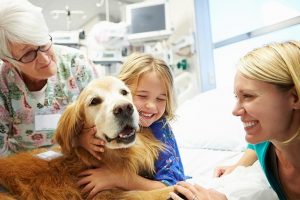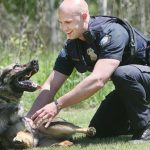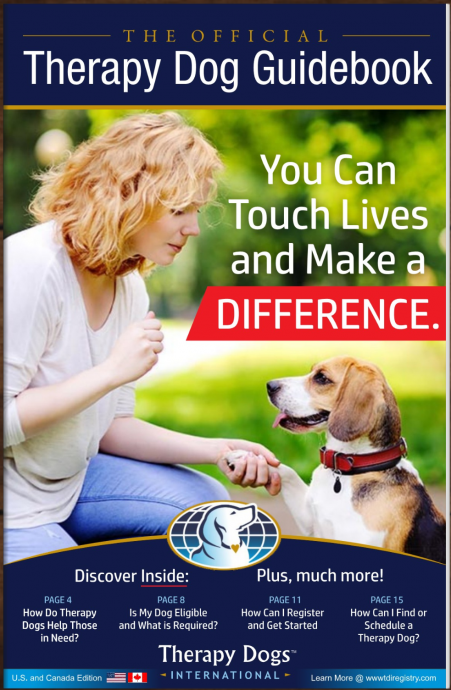How To Train a Therapy Dog
March 30, 2020

Humans are learning more and more these days about the health benefits of dogs. As a result, public interest in therapy dogs has been increasing. Therapy dogs provide relief to those in anxiety-provoking situations, bring comfort to those who are grieving or lonely, and offer affection to humans who are in institutions such as hospitals, nursing homes, and schools. If you’ve got a friendly, well-behaved dog that loves people, you and other owners in similar situations might be wondering — how are therapy dogs trained?
What Is a Therapy Dog?
A therapy dog lends comfort and affection to people in a facility setting or to certain individuals who require visitation to deal with a physical or emotional problem. Therapy dogs are not service dogs, who provide a specific service for a person with special needs, and who receive full public access per the Americans with Disabilities Act (ADA). They are also not emotional support animals, who require a prescription from a mental health or health care professional but need no special training or certifications to do their job.
Why Train a Therapy Dog?
Therapy dogs bring many physical benefits to the humans they visit. They may help lower blood pressure and heart rate, reduce patient anxiety, and increase levels of endorphins and oxytocin. But it’s not a one-way street. Studies have shown that therapy dogs also profit from their work. Rates of endorphins and oxytocin are higher in therapy dogs than average family pets.
“Therapy dogs go out to hospitals, nursing homes, libraries, schools, disasters. Essentially any venue where a clientele exists and it would be helpful for the dogs to be there,” says Linda Keehn, CPDT-KA, therapy dog trainer, evaluator, and handler, and owner of Positive canine training and services in New York.
But you can’t just take your dog to visit a relative in a hospital, for instance. Therapy dogs do need certification from, and registration in, a reputable national organization. Certification is the final hurdle in a dedicated process toward becoming a therapy dog, however, which includes temperament assessment, training, and more.
Can Any Dog Be a Therapy Dog?
Although your dogs may give you unconditional love, that doesn’t necessarily qualify them as a good fit for therapy work. Likewise, simply because you might be an empathetic person, you might also not be an ideal half of a therapy dog team. So what makes a good therapy dog and how do pups and people become a therapy dog team?
Therapy dogs must have attained adulthood, with many organizations not allowing puppies under a year old. Additionally, many organizations require dogs to pass the AKC canine good citizen (CGC) test for obedience, although others require a therapy-specific test in place of the CGC. Keehn, who both trains and evaluates dogs for CGC as well as therapy certification, affirms that these elements are extremely important for when any therapy dog is in public. A dog who can’t “leave it” on cue or interact with children in a friendly manner will not succeed.
Other than that, age and breed don’t really matter. Keehn has tested dogs as little as a four-pound Yorkshire Terrier and as old as 13-year-old Beagle– both of whom passed their CGC with flying colors. To avoid conflicts of interest, Keehn will only test teams for whom she’s played no role in training. Aside from basic obedience, the dog must possess a naturally social temperament not be too young or bouncy, and must want the job.
“Most dogs love jobs” says Keehn. “Your dog’s job may just be hiking alongside you, or something else. But most dogs like some kind of job and this is a wonderful job for them to have. However, it’s not fair to give a dog a job that it doesn’t want.”
Would Your Dog Make a Good Therapy Dog?
Keehn advises watching your dog closely and dispassionately at first to determine its true temperament. Most of all, she says, ask yourself if your dog likes affection from people other than you.
“Does the dog really enjoy interacting with new people in different scenarios?” asks Keehn. “Does it seek out attention from people and have a calm demeanor? It could be the nicest dog in your living room, but not elsewhere. Most often in a therapy situation, people just want a dog that sits next to them and lets itself be pet.”
In short, therapy dog candidates are naturally calm, friendly, and affectionate to strangers. They are also well-trained in basic obedience, and easily adaptable to novel noises, places, smells, and equipment. Most therapy dog organizations also require that dogs be healthy and well-groomed, with regular health and wellness check-ups.
Would You Make a Good Therapy Dog Handler?
Training a therapy dog can lead to new experiences for both dog and owner. The dog’s world opens up, and as a pair, you’re helping out your community. Keehn recommends joining a national or local therapy chapter that holds social events. That way, both you and your dog make friends. She also emphasizes that therapy dog work is as good for the person as it is for the dog. Still, she cautions that while the handler and the dog are working together, sometimes handlers must play unforeseen roles.
“Getting out of yourself and giving back to the community can improve your own mental and physical health,” says Keehn. “When you’re bringing a dog to a veterans’ organization or hospital, you may be the only non-medical person they’re seeing. It may be the only real conversation they’ve had for days. Be prepared as the therapy dog handler to connect to the client. It may be helpful to take a cognitive dog training course.”
Other good advice for handlers includes mentoring with another handler who knows how to train a therapy dog. Refer to a reputable trainer for additional background or experience. At the very least, Keehn says, most therapy dog organizations have printed material or websites that you can read in preparation.
Plus, you can often choose where you work. If your dog loves children, opt to visit schools or libraries. But if you don’t love children, then that will be a mismatch. Then, you might opt for home visits with the elderly instead.
How Are Therapy Dogs Trained?
You can choose to train a therapy dog on your own or with assistance. Keehn, who helps owners train their dogs as one-half of a therapy team, advises that you look for a formal organization that lists well-educated trainers on their websites to assist you on your path.
If private training is too expensive, Keehn recommends reviewing the CGC test for the ten basic commands, then going on YouTube and watching videos for tips. Taking a group Canine Good Citizen class is another good option, perhaps following up with more directed and targeted classes. While the ten commands are necessary to pass the CGC the test, training, especially done by positive reinforcement is invaluable and lasts a lifetime.
“Every time you interact with your dog, your dog is learning something,” confirms Keehn. “Reinforce the behavior you want. Keep your criteria at a level that your dog can handle. Be clear in your communication with non-verbal and verbal cues. You don’t need to touch the dog. They learn to follow their basic instincts to sit and lay down by doing what’s comfortable.”
Tips For How To Train A Therapy Dog
Learning to train a therapy dog is no easy task, and often requires a lot of work on behalf of both the dog and the handler. Indeed, some of the most well-trained dogs in the world will never become suitable therapy dogs due to their temperament. Conversely, some tricky-to-train dogs will open up with the right training style, and may end up excellent therapy dogs. The information above provides a deep-dive into how to train a therapy dog, but to boil it down to basics, here’s a good place to start:
- Socialize your puppy or dog to new people, places, objects, and surfaces.
- Obtain the AKC CGC title for your dog. Train necessary behaviors for therapy work including “leave it”, “watch me”, loose-leash walking and not jumping on people (“four on the floor”).
- Consider moving up to the AKC Advanced Canine Good Citizen (AKC Community canine) title to practice CGC test items in a real-world scenario. Or the Urban CGC if you live or plan to visit in busy urban areas.
- Enroll your dog in a therapy dog class that will prepare you and your dog for visits. Many classes will include a therapy dog evaluation at the end of the class.
- Once you’ve passed your test, register with a national therapy dog organization to begin making visits and brightening lives. It’s your responsibility, however, to stay on top of your dog’s training and make sure they’re the best therapy dog they can possibly be.













